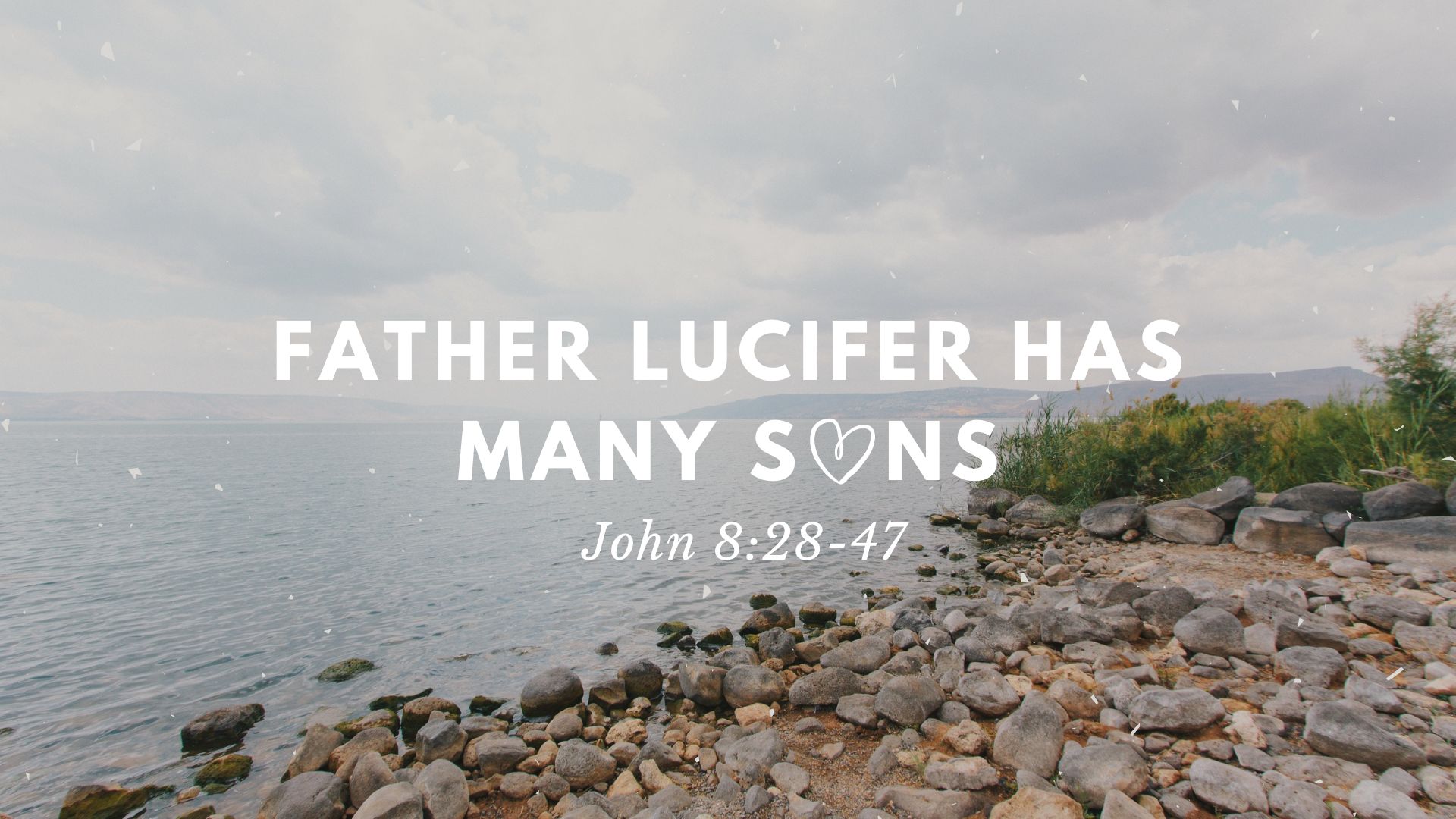
John 11:1-44 – While My Savior Gently Weeps
The waiting room.
“I hate when they make you wait in the room. ‘Cause it says ‘Waiting Room.’ There’s no chance of not waiting. ‘Cause they call it the waiting room, they’re gonna use it. They’ve got it. It’s all set up for you to wait.”
You might recognize that snippet from comic Jerry Seinfeld. It resonates because we hate the wait.
We are going to talk about waiting… but not ours.
Jesus waited. He waited two days after He received news that His friend, Lazarus, was seriously sick. While Jesus waited, Lazarus died. It caused both the sisters of Lazarus, Martha and Mary, to say to Him upon His arrival, “Lord, if You had been here, my brother would not have died.”
Not to worry, sisters. Jesus will call Lazarus forth from the tomb and encourage us about our permanent resurrection from the dead.
I’ll organize my comments around two points: #1 When Jesus Waits, You Experience What You Believe, and #2 When Jesus Waits, You Experience How He Loves.
#1 – When Jesus Waits You Experience What You Believe (v1-16)
Police officer candidates attend the academy for six months. When they are picked-up by a department, they undergo months of Field Training.
Their Field Training Officer (FTO) evaluates them on how they translate what they learned in the academy to life on the mean streets of Riverdale.
We need to experience how what we learn about God translates on the mean streets of the world.
Jesus was about to lead His guys into the world of death, life, and the afterlife to experience the difference it makes knowing God.
Joh 11:1 Now a certain man was sick, Lazarus of Bethany, the town of Mary and her sister Martha.
He is not the Lazarus from the famous duo of the Rich Man & Lazarus. He lived with his two sisters, Martha & Mary. Jesus often enjoyed their hospitality.
Joh 11:2 It was that Mary who anointed the Lord with fragrant oil and wiped His feet with her hair, whose brother Lazarus was sick.
Mary was known for one remarkable act of love for Jesus. It is reported out of order; it occurs after her brother was raised from the dead, in chapter twelve.
We’ve asked you before, “What do you want on your Tombstone?”
Joh 11:3 Therefore the sisters sent to Him, saying, “Lord, behold, he whom You love is sick.”
The Gospels emphasize Jesus’ humanity. He set aside the independent use of His deity in order to be our example of a man walking with God.
Jesus was omniscient, but as a man, He was hearing this news for the first time. It’s no different from you hearing similar news about a friend.
Joh 11:4 When Jesus heard that, He said, “This sickness is not unto death, but for the glory of God, that the Son of God may be glorified through it.”
We would call this a word of knowledge, a prophecy, and a gift of healing. A gift trifecta.
Did God the Father cause Lazarus to be sick and die? That would be an assumption based entirely on theology.
We know nothing about Lazarus except what we read here. He may have been an old man, a widower, infirm, living out his days with his two seemingly spinster sisters.
Loved ones die. They die old, they die young; they die of natural causes, they die from illnesses, they die peacefully, and tragically.
Joh 11:5 Now Jesus loved Martha and her sister and Lazarus.
Joh 11:6 So, when He heard that he was sick, He stayed two more days in the place where He was.
Jesus had a close relationship with them. All the same, He is not capable of loving anyone less. John tells us He loved them so we would understand His deliberate delay was an expression of love.
Joh 11:7 Then after this He said to the disciples, “Let us go to Judea again.”
Joh 11:8 The disciples said to Him, “Rabbi, lately the Jews sought to stone You, and are You going there again?”
Joh 11:9 Jesus answered, “Are there not twelve hours in the day? If anyone walks in the day, he does not stumble, because he sees the light of this world.
Joh 11:10 But if one walks in the night, he stumbles, because the light is not in him.”
There is a time to wait, and a time to stop waiting. The physical danger to Himself and to His disciples did not factor into His decision. Jesus was all about obeying the Father.
Obedience is like walking in the daytime, in the light. Disobedience is a futile attempt to walk in darkness. You’ll stumble and fall.
There may be times you and everyone else assumes they know what to do, but are not listening to God.
This episode is not an excuse to hesitate. It is a reminder to press on in the will of God.
Joh 11:11 These things He said, and after that He said to them, “Our friend Lazarus sleeps, but I go that I may wake him up.”
Joh 11:12 Then His disciples said, “Lord, if he sleeps he will get well.”
Joh 11:13 However, Jesus spoke of his death, but they thought that He was speaking about taking rest in sleep.
Joh 11:14 Then Jesus said to them plainly, “Lazarus is dead.”
Jesus received a second word of knowledge – Lazarus was “dead.” From Abel to Jesus, the souls of everyone who died went to Hades. Separated from their physical body, they were conscious and alive and could feel.
Since everyone will be resurrected in their own order, the Bible describes your physical death as “sleep.”
Joh 11:15 And I am glad for your sakes that I was not there, that you may believe. Nevertheless let us go to him.”
We know that Jesus’ deliberate delay was going to result in a notable miracle. We have a “Just wait – this is gonna be great” excitement reading it.
For the most part, our loved ones don’t rise from the dead. We have to wait until our reunion in Heaven.
Besides John the Baptist, Lazarus may have been the closest person to Jesus who had died during His ministry. This was a good ‘field’ to translate what Jesus had taught the disciples.
Joh 11:16 Then Thomas, who is called the Twin, said to his fellow disciples, “Let us also go, that we may die with Him.”
Was Thomas a downer? Gimli the dwarf helps us see Thomas in a different than usual light. Aragorn announced he was marching to the Black Gate of Mordor. Gimli responded, “Certainty of death? Small chance of success? What are we waiting for?”
Thomas said. “Let us also go, that we may die with Him.” Jesus told us to “Go” into all the world, making disciples (Matthew 28).
Jesus said, “If anyone desires to come after Me, let him deny himself, and take up his cross daily, and follow Me. For whoever desires to save his life will lose it, but whoever loses his life for My sake will save it” (Luke 9:23-24).
Our next church T-shirt: Let us also “Go,” that we may die with Him.
#2 – When Jesus Waits You Experience How He Loves (v17-44)
It is called, Impassibility.
It is the branch of theology that asks, “Is God capable of suffering or feeling pain?” If so, to what extent does our behavior affect Him?
Jesus certainly wasn’t impassible. He felt strongly.
Joh 11:17 So when Jesus came, He found that he had already been in the tomb four days.
Joh 11:18 Now Bethany was near Jerusalem, about two miles away.
Joh 11:19 And many of the Jews had joined the women around Martha and Mary, to comfort them concerning their brother.
The Jews were a same-day burial culture. You had to be constantly ready for a funeral. A reversible tunic could come in handy. Always wearing black might be a good idea.
Joh 11:20 Now Martha, as soon as she heard that Jesus was coming, went and met Him, but Mary was sitting in the house.
Joh 11:21 Now Martha said to Jesus, “Lord, if You had been here, my brother would not have died.
Joh 11:22 But even now I know that whatever You ask of God, God will give You.”
Martha did the math. She knew Jesus had deliberately delayed. This is a “Where were you, you need to make this right,” comment.
Joh 11:23 Jesus said to her, “Your brother will rise again.”
Joh 11:24 Martha said to Him, “I know that he will rise again in the resurrection at the last day.”
Martha misunderstood. Her brother was going to rise right now. D.L. Moody commented, “Jesus never preached any funeral sermons.”
Joh 11:25 Jesus said to her, “I am the resurrection and the life. He who believes in Me, though he may die, he shall live.
Joh 11:26 And whoever lives and believes in Me shall never die. Do you believe this?”
Billy Graham said, “You’re born. You suffer. You die. Fortunately, there’s a loophole.”
All the dead will be resurrected, the righteous over a period of time, then the wicked, all at once.
You might join the believers who die before the coming of the Lord. You’ll live! Again quoting Moody, “As I go into a cemetery I like to think of the time when the dead shall rise from their graves. Thank God, our friends are not buried; they are only sown.”
Who are the believers who “shall never die?” We are; or at least, some of us might be. It’s the rapture! “We shall not all sleep, but we shall all be changed – in a moment, in the twinkling of an eye…” (First Corinthians 15:51-52).
Joh 11:27 She said to Him, “Yes, Lord, I believe that You are the Christ, the Son of God, who is to come into the world.”
Martha did not yet have the Book of Romans, but she was trusting that all things would work together for the good because she, her sister, and Lazarus, most certainly loved the Lord, and vice-versa.
Joh 11:28 And when she had said these things, she went her way and secretly called Mary her sister, saying, “The Teacher has come and is calling for you.”
Joh 11:29 As soon as she heard that, she arose quickly and came to Him.
Joh 11:30 Now Jesus had not yet come into the town, but was in the place where Martha met Him.
Martha rushed to Jesus; Mary came when called. Two very different personalities.
Don’t think there is only one way that every Christian must react to suffering or death. We all should react as a believer should and can, in the power of the resurrection, grieving but with hope, looking to eternal life. However, everyone processes pain differently. Some may be in the academy, so to speak. Others, in their field training. Still others, already spiritual FTO’s.
Joh 11:31 Then the Jews who were with her in the house, and comforting her, when they saw that Mary rose up quickly and went out, followed her, saying, “She is going to the tomb to weep there.”
People mean well. But these people had an idea of what Mary ought to be doing. Often times it is the person who is hurting that ends up ministering to those who came to comfort them.
Joh 11:32 Then, when Mary came where Jesus was, and saw Him, she fell down at His feet, saying to Him, “Lord, if You had been here, my brother would not have died.”
To hear this a second time, that’s rough. Especially since Jesus was following His Father’s timeline.
You can be 100% in God’s will and be totally misunderstood. In the Book of Acts, God was leading the apostle Paul to Jerusalem. He was warned along the way that chains awaited him. He went anyway. Lots of commentators suggest he was not in the will of God. Of course he was.
Martha and Mary did not think Jesus would let their brother die. When He did, it threw them. They were struggling with an old problem.
Why do the righteous suffer? How do we account for the proliferation of evil and its consequences?
We talk about this quite a lot. We suggest that our free will is responsible for evil and its consequences. Christian novelist Dee Henderson summarizes it nicely, saying, “God decided to create a world where free will was more important than no one ever getting hurt. There must be something stunningly beautiful and remarkable about free will that only God can truly grasp, because God hates, literally abhors, evil, yet He created a world where evil could happen if people chose it.”
Joh 11:33 Therefore, when Jesus saw her weeping, and the Jews who came with her weeping, He groaned in the spirit and was troubled.
Joh 11:34 And He said, “Where have you laid him?”They said to Him, “Lord, come and see.”
Joh 11:35 Jesus wept.
Bible Trivia: In Greek, “Jesus wept” has sixteen letters. A shorter verse in Greek is First Thessalonians 5:13, “Rejoice always,” having only fourteen letters.
Jesus would weep again, looking over Jerusalem and seeing its destruction for having rejected Him.
It’s a safe bet to say He cried more. He was described by Isaiah as a “man of sorrows, and acquainted with grief” (53:5). He wasn’t a bummer to be around; He was full of unspeakable joy. He had the full spectrum of emotions, perfectly.
Joh 11:36 Then the Jews said, “See how He loved him!”
Joh 11:37 And some of them said, “Could not this Man, who opened the eyes of the blind, also have kept this man from dying?”
When asked, “Why do bad things happen to good people?”, you could answer, “That only happened once, and He volunteered.” Think about it.
Joh 11:38 Then Jesus, again groaning in Himself, came to the tomb. It was a cave, and a stone lay against it.
God is affected by His creatures. Jesus wept, then there was “groaning within Himself.”
God the Holy Spirit is said to “groan” within believers (Romans 9:26). He does not interpret our groans. He groans. He also can be grieved. Groanin’ & Grievin’ is a Christian country song waiting to be written.
Joh 11:39 Jesus said, “Take away the stone.” Martha, the sister of him who was dead, said to Him, “Lord, by this time there is a stench, for he has been dead four days.”
Joh 11:40 Jesus said to her, “Did I not say to you that if you would believe you would see the glory of God?”
Christians are sometimes troubled about cremation, or about bodies that are otherwise destroyed. Lazarus was decayed, yet it posed no problem. God knows the location of each molecule. Besides, your resurrection body will be different from your current body. It will have a connection to it, but it is like a plant having a connection with its seed.
Joh 11:41 Then they took away the stone from the place where the dead man was lying. And Jesus lifted up His eyes and said, “Father, I thank You that You have heard Me.
Joh 11:42 And I know that You always hear Me, but because of the people who are standing by I said this, that they may believe that You sent Me.”
Jesus’ public prayer was sincere, but it was more than Him talking to the Father. He prayed to convey a truth to the hearers. If you are ever asked to pray out loud, publicly, sneak in the Gospel. Read a verse. And use the ‘J’ word – Jesus.
Notice, too, that Jesus prayed with His eyes open.
Joh 11:43 Now when He had said these things, He cried with a loud voice, “Lazarus, come forth!”
Joh 11:44 And he who had died came out bound hand and foot with graveclothes, and his face was wrapped with a cloth. Jesus said to them, “Loose him, and let him go.”
After twenty-one previous films, we finally get to hear Captain America say, “Avengers, assemble.” I think most people were expecting a shout, but he spoke barely over a whisper.
Jesus went loud so that there would be no doubting He was being used by the Father to recall Lazarus.
The part of Hades where Lazarus resided after death was called Abraham’s Bosom, and Paradise. If I was an old man, living with my sisters in the first century, I’d prefer Hades to home. Besides that, the Jews would want to kill him in order to ‘bury’ the evidence that he had been raised.
His hands and feet bound, it must have been hard for him to move. Neither could he see. Exiting the tomb was not without a lot of humor. He was doing the Mummy Hop.
Lazarus exited the tomb. The mourners grief turned to joy.
Jesus knew this; why weep? He understood the problem of evil and its consequences more than any merely mortal man.
He was the Creator. He had been in the Garden of Eden when our parents chose to disobey Him for a fig. He knew every sin, hurt, pain, and death that followed in the wake, century after century. He knew He would preside over the judgment of all the unrighteous to be sentenced to the Second Death.
I appreciate that He cries. “For we do not have a High Priest who cannot sympathize with our weaknesses, but was in all points tempted as we are, yet without sin” (Hebrews 4:15).
Raising Lazarus brought glory to Jesus. It also revealed God’s love for His creation. Not just love as an attribute of God, or by dryly stating that “God is love.”
Charles Spurgeon said, “A Jesus who never wept could never wipe away my tears.”
Jesus waited two days. Lazarus died. His sisters mourned. His community mourned.
Jesus has been waiting about two thousand years since He ascended into Heaven. Incredible suffering has taken place during His wait. The apostle Peter informs us God is “longsuffering toward us, not willing that any should perish but that all should come to repentance… the longsuffering of our Lord is salvation” (Second Peter 3:9&15).
We “wait for His Son from Heaven, whom He raised from the dead, even Jesus who delivers us from the wrath to come” (First Thessalonians 1:10).









